- Home
- Bertolt Brecht
Collected Plays, Volume 4 (Bertolt Brecht: Plays, Poetry & Prose) 8 Page 15
Collected Plays, Volume 4 (Bertolt Brecht: Plays, Poetry & Prose) 8 Read online
Page 15
CRY: That is blasphemy! Do you deny that the use of violence debases the man who uses it?
RIGAULT: No, I do not deny it.
CRIES: Silence him! Speeches like that discredit us. Look around you. We are not so many as we were in March. Delescluze, you speak to us! Delescluze! Delescluze!
DELESCLUZE: Citizens, you see me undecided, I confess. For so long now I too have solemnly spoken out against the use of violence. ‘Disprove,’ I said, ‘the rooted opinion that justice has need of violence. For once, at long last, let justice prevail by the work of our bare hands. Lies have to be written in blood, truth can be written in ink,’ I said. ‘In a few weeks the Commune of Paris has done more for the dignity of man than all other regimes in the course of eight centuries. Let us continue calmly bringing order into human dealings and putting an end to the exploitation of man by man,’ I said. ‘Let us dedicate ourselves to our working people who are useful to all who are not harmful pests. Then the two or three score exploiters in Versailles will see the host of slaves around them melt away like snow in the spring sun. The voice of reason, untainted by anger, will stop our murderers in their tracks, the simple sentence “you are workers like us” will bring them running into our welcoming arms.’ That is what I said, and many of you said the same. May I and may you be forgiven if we were deceiving ourselves. I ask those delegates still opposed to reprisals to raise their hands.
Slowly most raise their hands.
DELESCLUZE: Citizen Delegates, you will be issued with arms.
National Guardsmen have entered laden with rifles. They distribute them among the delegates.
DELESCLUZE: Citizen Delegates, we shall continue with the business in hand. The next item is the organisation of a commission for the education of women.
NONE OR ALL
1
Who will deliver you, slave?
Comrade, those deepest below
They are the ones who will see you
They, when you cry out, will hear you
Slaves will deliver you, slave.
None or all, all or nothing it will be.
No one can set himself free.
Guns or chains it must be.
None or all, all or nothing it will be.
2
You who are hungry, who’ll feed you?
Do you want bread for your hunger?
Come to us, we also suffer.
Come to us, let us guide you
We, the hungry, we’ll feed you.
None or all, all or nothing it will be.
No one can set himself free.
Guns or chains it must be.
None or all, all or nothing it will be.
3
For vengeance, where will you look?
Comrade of ours, whom they beat
Join with all they maltreat
We are like you, we are weak.
We are the avengers you seek.
None or all, all or nothing it will be.
No one can set himself free.
Guns or chains it must be.
None or all, all or nothing it will be.
4
You who are lost, who will dare?
Whoever’s too wretched to bear
More must join with those now
Desperate: they’re making sure
Today is the day, not tomorrow.
None or all, all or nothing it will be.
No one can set himself free.
Guns or chains it must be.
None or all, all or nothing it will be.
12
Place Pigalle, Easter Sunday 1871. Jean Cabet, François Faure and two children are working at a barricade. Babette Cherron and Genevieve Guéricault are stitching sandbags. Distant thunder of cannon. Genevieve has been singing a song to the children who are mixing mortar in a wooden bath with shovels bigger than themselves.
CHILD: Would you sing it again, please, mademoiselle.
GENEVIÈVE: Yes, but that’s the last time. She sings.
Eastertide. Fair on the Seine
For Grandpa and everyone.
All the blue rowing boats down there
Are painted fresh again.
Looking for Easter eggs you hear
Among the trees, from far away
The little children swear
Getting towards mid-day.
At table under the greenery
We tell what fun it’s been
And we’ll go fishing at Ivry
At Eastertide next year.
CHILD singing after her. At Eastertide next year.
SECOND CHILD to Jean: Do you and Babette sleep together?
JEAN: Yes.
CHILD: She’s going to have a baby, isn’t she?
JEAN: Mm. Because she fell in love with me.
BABETTE: You fell in love with me.
JEAN: Whatever. But she started it, let me tell you.
BABETTE: How did I start it? I never said a word. It was you.
JEAN: Yes, I know. But your eyes.
BABETTE: And yours? To François: What are you sulking for?
FRANÇOIS: I don’t like the way you said ‘Thilippe has run away’. You have to look at it scientifically, that is dispassionately. I assume the fight seemed to him hopeless, whereas it doesn’t to us. Therefore he leaves Paris.
JEAN: Us you mean. Us fighting.
FRANÇOIS: Not us, only the hopeless fight.
JEAN: Unfortunately we can’t leave Paris as easily as that. Why? The leaves can’t leave the tree. Woodlice can. Philippe’s a louse.
FRANÇOIS: I shall have to knock your teeth out, Jean.
JEAN: But dispassionately, if you don’t mind.
FRANÇOIS helplessly: Oh Jean, we don’t know anything. Pause. What you are thinking could perhaps be expressed so: Philippe is not an especially brave person because he hasn’t learned to think.
JEAN: Good.
BABETTE: Geneviève, if I move in with Jean will you be able to pay the rent on your own?
Pause.
GENEVIÈVE: Yes, Babette.
JEAN: Oh damn it, must you women always be talking about the future?
GENEVIÈVE softly: She must, Jean.
FRANÇOIS: It’s bad that we are cut off from the country. We can’t speak to France.
GENEVIÈVE: They can think for themselves.
JEAN: Babette, that reminds me, we must fetch what we painted. One thing is certain: if they attack, Paris will be their grave, eh François?
They carry on working. Enter Mme Cabet.
MME CABET: Very sorry, I felt a real need to go to early morning mass and last night I stitched four extra bags. Now you shall have your Easter presents.
She hands François a parcel.
FRANÇOIS opening it: Lavoisier! Only yesterday I wanted to look up something particular in him.
MME CABET: Oh Jules and Victor, I’m sorry, you should have had yours first. She gives each of them a bread roll. Jean, this is a tie, I shortened the flag a bit, Papa was vexed but I did it anyway. I’ve got nothing for you, Geneviève, but I’ll shake hands with you. She shakes hands with Geneviève. It’s always so embarrassing when you haven’t got a present to give, isn’t it? And this is for you and really for somebody else, Babette, you know who I mean, don’t you? She gives Babette an Easter egg. Next Easter he’ll have one like that.
JEAN: She will.
They laugh.
MME CABET: And now I’d like you to come upstairs with me. There’s a drop of wine left.
All follow her except Geneviève. Then when Geneviève also stands up she sees two nuns coming towards her.
FIRST NUN softly: Geneviève.
GENEVIÈVE runs towards the nun and embraces her: Guy!
GUY: Softly, my darling. Was it very bad?
GENEVIÈVE: But why are you dressed up like this? Seven months!
GUY: Can you take us to your room? Do you live on your own? And can you get me a razor? My blasted beard!
GENEVIÈVE: But why all the se
crecy? You’re here now and safe. Did you escape?
GUY: No, I’ll explain everything, in your room.
GENEVIÈVE: But I don’t live on my own any more. Babette’s there, she might come in at any moment. I mean, if you don’t want anybody to see. Guy, you’re not in Paris against the Commune, are you? Not for Thiers?
GUY: Oh so you’re still for the International, are you? Despite all the atrocities?
GENEVIÈVE: What atrocities?
GUY: Enough. The time for revolutionary and sloppy humanitarian speeches is over. Now it’s serious. The whole of France is sick of your looting and violence.
GENEVIÈVE: So you’ve become a spy for the butcher Thiers?
GUY: Geneviève. We can’t discuss that out on the street. I’ve been spotted, I didn’t want to involve you, my damned beard forced me. After all, we are engaged, or we were, that might be more accurate. You can’t let me perish and the sisters of Saint Joseph are involved as well. You’re a Catholic, aren’t you, or is that over and done with as well?
GENEVIÈVE: Yes, Guy, it is.
GUY: A nice way to treat me! And all out on the street!
GENEVIÈVE: The street is a good place. We are just getting ready to defend our homes on the street.
GUY: That is all utter madness. Versailles is ready to march in, three army corps. And if you hand me over … He reaches under his nun’s habit for a pistol.
PAPA who has arrived with Coco and has witnessed some of the foregoing: One moment, monsieur. He levels his rifle at him. You have some interesting friends, mademoiselle.
GENEVIÈVE: Monsieur Guy Suitry, my fiancé, Papa.
The nun Guy arrived with suddenly runs away.
PAPA: Stop her, Coco. Or him. To Geneviève: Explain.
GENEVIÈVE while Coco chases the nun: Monsieur Suitry was a prisoner-of-war in Germany. Now he’s on business in Paris for Monsieur Thiers.
GUY: Geneviève!
PAPA: Oh. I’m sorry, Geneviève.
COCO returning: No breasts, but female. This one goes up against a wall. And then a little visit to the Convent Saint Joseph. With his bayonet he prods Guy to the barricade. Turn round.
FRANÇOIS arriving: Geneviève, why didn’t you come up? What’s happening here?
PAPA: Genevieve’s Guy has come back. Bismarck gave him back to Thiers so he could come and spy on us here. And the nuns of Saint Joseph mercifully took him in. To Guy: Turn round.
FRANÇOIS: You can’t do that. You can arrest him.
PAPA: Then he goes off to the Petite Roquette and can eat cutlets with his Eminence the Archbishop. Unfortunately our people in the Commune are trying to be even more merciful than Saint Joseph, till we’re all up against a wall. To Guy: No, you won’t be telling anyone what you’ve seen in the rue Pigalle.
FRANÇOIS: Nothing rash, Papa.
PAPA: Oh so that’s being rash, is it? General Gervaise sells one of our forts to Versailles but I’m being rash, am I? Of course, you people here think I’m in a bit deeper than you are and that explains why I’m not very gentle. To Geneviève: There was that certain morning when we met and I hadn’t slept, remember?
GENEVIÈVE: Citizen Goule, I have learned in the meantime that the motto must be: ‘All for one and one for all’. And even if it was only to defend you I would not leave this barricade.
PAPA uncertainly: I think I understand you.
FRANÇOIS: Madame Cabet won’t allow it, Papa. Let Geneviève decide, don’t do anything in haste. Geneviève, tell them you don’t want that. You mustn’t think we’ll think it’s because he’s your fiance. Speak to them, Geneviéve.
Geneviéve says nothing.
PAPA: Very well, Geneviève. Go indoors.
COCO: Turn round, you.
Enter Mme Cabet with the children.
MME CABET: Jean and Babette wanted to be on their own. Love, I ask you! Better than stitching sandbags. What are you doing?
COCO: Not a nun, Madame Cabet. Genevieve’s fiancé, a spy.
MME CABET: Why’s he standing up against the wall? He’s not feeling well, you can see that, can’t you? Nobody speaks. No! Don’t do that, not on Easter Sunday. And in front of the children! Not in front of the children! Absolutely not! Hand him over to the police, that’s bad enough for Geneviève. You come with me and have a glass of wine. You need it. Now don’t do anything stupid here.
PAPA vexed: The devil take the lot of you. They’ll stamp you out like vermin. Quick march, swine, say thank you to the children, they’re the ones who decide in Paris.
He and Coco lead Guy away.
FRANÇOIS to the children: Let’s get to work.
They begin their work again. Mme Cabet tries to lead Geneviève away but she shakes her head and sits down to stitch sandbags.
FRANÇOIS: There are bad people on our side too. The battalions are even enlisting criminals now.
MME CABET: Yes. Being with us is the only good thing they will ever do.
FRANÇOIS: At the top too. People working for their own advantage.
MME CABET: We get what we get.
FRANÇOIS: I’ll have to chop the apple tree down.
MME CABET: Do we really have to? Enter Jean and Babette. Jean and Babette, François wants to chop down the apple tree.
BABETTE: No.
JEAN: We’ll never make a proper barricade with it in the way. But we’ll leave it if you want. Pats the barrel of the cannon. Ammunition or no ammunition it’s good to have you, whatever the generals say, our own included. He and Babette unroll a linen banner: ‘You are workers like us’. There’s my statement, François. They hang it over the barricade, the writing towards the attackers. We have to tell them.
MME CABET: I don’t know, Jean, if it’s those they had in the army before, from the provinces … farm labourers working sixteen hours a day and the sons of debt-ridden grocer women, even the cobblers think they’re something better than workers.
JEAN: Perhaps they’ll think again when they see the words along with our bullets, maman.
13
Place Pigalle, May, during Bloody Week. At the barricade, ready to fire, stand Geneviève Guéricault, Jean Cabet, François Faure and two civilians. The German cuirassier is dragging a crate of ammunition after Papa into the corner of the wall. A badly wounded woman, a stranger, is lying in a sheltered place. Heavy artillery fire. Rolling of drums, which signifies attacks in neighbouring streets. The apple tree is in full bloom.
FRANÇOIS shouting loudly. Langevin and Coco would have been here long ago if they were still alive. It’s three days now.
PAPA: Coco’s alive. And if Paris can send them home today with bloody noses the whole Versailles rabble will melt away, once and for all.
FRANÇOIS: They are heavily armed. With mitrailleuses. Have you noticed how the New Age always gives its weapons to the hyenas of the Old Age first?
PAPA: On 18 March we’d have cleared out the lot of them in two hours.
FRANÇOIS: What do you think, Jean?
JEAN: As I told you once before, we know nothing.
GENEVIÈVE: At least we’re learning now, Jean.
JEAN: AS we croak. Much good that will do us.
GENEVIÈVE: It will do some good, Jean. Here they come again.
JEAN: Not yet. What good is knowing to me and you, Geneviève, when we’re dead?
GENEVIÈVE: I’m not talking about me and you. I said ‘we’. ‘We’ are more than me and you.
JEAN: I only hope ‘we’ will be out in force alongside us and behind us now.
It has got rather quieter.
WOUNDED WOMAN suddenly clear: Friends, I live at 15 rue des Cygnes, write on the wall, will you, near the door, for my husband, what’s happened to me, my name is Jardain.
FRANÇOIS: I will, 15 rue des Cygnes.
WOUNDED WOMAN: We wanted to go on fighting the Prussians because we were told they wouldn’t give us back the prisoners straight away. Isn’t that right? They had two of mine. Now they are coming back, like that. She points over the barr
icade. What things they must have told them about us! Now I feel bad again. She sinks back and becomes delirious.
FRANÇOIS: They have to do it. That’s what makes them so raving mad.
JEAN: We ought to carry her indoors.
FRANÇOIS: Not if she doesn’t want. She’s frightened the house will burn.
JEAN: But she’s in the way here.
FRANÇOIS: Not very much, Jean. And she was fighting, wasn’t she?
JEAN: Yes, she can handle a gun.
Drums very near.
JEAN: That’s in the rue Bac.
Enter Pierre Langevin followed by a child.
LANGEVIN trying to shoo the child away: Run along, that’s an order, you’re only in the way here. The child moves back, but then halts, waiting for him. They need reinforcements in the rue Bac.
JEAN shrugging his shoulders: Where’s Coco?
LANGEVIN shakes his head, glancing at Papa, then: Can you spare the cuirassier?
PAPA: Salut, Coco. No, he only understands my language. What’s happening in the Hôtel de Ville?
LANGEVIN: There’s no one left there. They’re on the barricades. Delescluze was killed in the Place du Chateau d’Eau. Vermorel is wounded, Varlin is fighting in the rue Lafayette. The slaughter at the Gare du Nord is such that women are rushing into the streets, boxing the officers’ ears and putting themselves up against the wall.
Langevin goes on his way, the child following him.
JEAN: Things are bad, he didn’t ask after Mother.
Mme Cabet and Babette bring soup.
MME CABET: Children, you must eat, but there’s no chives in it. And why must you wear your kepis? When we’ve done all we can, they’ll only give you away. You’ll have to eat with the serving-spoon …
Handing Jean the serving-spoon, she collapses.
JEAN: Maman!
FRANÇOIS: From the roofs.

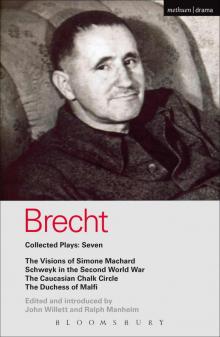 Bertolt Brecht: Mutter Courage und ihre Kinder 7
Bertolt Brecht: Mutter Courage und ihre Kinder 7 Bertolt Brecht
Bertolt Brecht Bertolt Brecht: Mutter Courage und ihre Kinder 6
Bertolt Brecht: Mutter Courage und ihre Kinder 6 Bertolt Brecht: Mutter Courage und ihre Kinder 4
Bertolt Brecht: Mutter Courage und ihre Kinder 4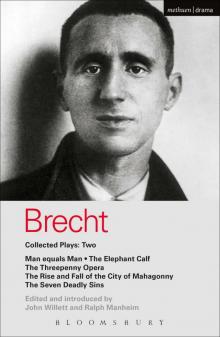 Bertolt Brecht: Mutter Courage und ihre Kinder 2
Bertolt Brecht: Mutter Courage und ihre Kinder 2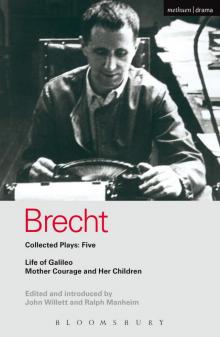 Bertolt Brecht: Mutter Courage und ihre Kinder 5
Bertolt Brecht: Mutter Courage und ihre Kinder 5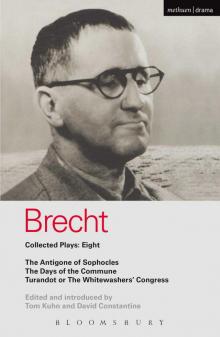 Collected Plays, Volume 4 (Bertolt Brecht: Plays, Poetry & Prose) 8
Collected Plays, Volume 4 (Bertolt Brecht: Plays, Poetry & Prose) 8 Mother Courage and Her Children
Mother Courage and Her Children Bertolt Brecht: Mutter Courage und ihre Kinder 1
Bertolt Brecht: Mutter Courage und ihre Kinder 1 Brecht Collected Plays: 3: Lindbergh's Flight; The Baden-Baden Lesson on Consent; He Said Yes/He Said No; The Decision; The Mother; The Exception & the ... St Joan of the Stockyards (World Classics)
Brecht Collected Plays: 3: Lindbergh's Flight; The Baden-Baden Lesson on Consent; He Said Yes/He Said No; The Decision; The Mother; The Exception & the ... St Joan of the Stockyards (World Classics)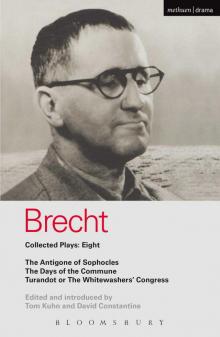 Brecht Plays 8: The Antigone of Sophocles; The Days of the Commune; Turandot or the Whitewasher's Congress: The Antigone of Sophocles , The Days of the Comm (World Classics)
Brecht Plays 8: The Antigone of Sophocles; The Days of the Commune; Turandot or the Whitewasher's Congress: The Antigone of Sophocles , The Days of the Comm (World Classics) Brecht Collected Plays: 1: Baal; Drums in the Night; In the Jungle of Cities; Life of Edward II of England; & 5 One Act Plays: Baal , Drums in the Night , In the Jungle of Ci (World Classics)
Brecht Collected Plays: 1: Baal; Drums in the Night; In the Jungle of Cities; Life of Edward II of England; & 5 One Act Plays: Baal , Drums in the Night , In the Jungle of Ci (World Classics)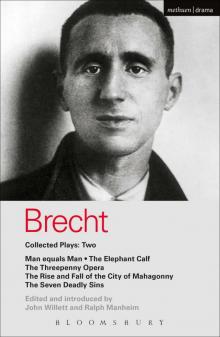 Brecht Collected Plays: 2: Man Equals Man; Elephant Calf; Threepenny Opera; Mahagonny; Seven Deadly Sins: Man Equals Man , Elephant Calf , Threepenny Ope (World Classics)
Brecht Collected Plays: 2: Man Equals Man; Elephant Calf; Threepenny Opera; Mahagonny; Seven Deadly Sins: Man Equals Man , Elephant Calf , Threepenny Ope (World Classics)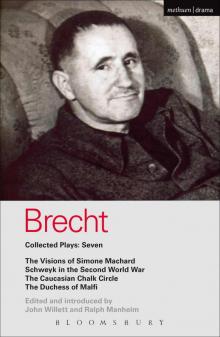 Brecht Collected Plays: 7: Visions of Simone Machard; Schweyk in the Second World War; Caucasian Chalk Circle; Duchess of Malfi (World Classics)
Brecht Collected Plays: 7: Visions of Simone Machard; Schweyk in the Second World War; Caucasian Chalk Circle; Duchess of Malfi (World Classics) Berliner Ensemble Adaptations
Berliner Ensemble Adaptations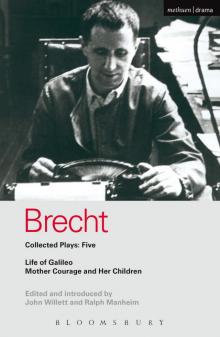 Brecht Collected Plays: 5: Life of Galileo; Mother Courage and Her Children (World Classics)
Brecht Collected Plays: 5: Life of Galileo; Mother Courage and Her Children (World Classics) Brecht Collected Plays: 6: Good Person of Szechwan; The Resistible Rise of Arturo Ui; Mr Puntila and his Man Matti (World Classics)
Brecht Collected Plays: 6: Good Person of Szechwan; The Resistible Rise of Arturo Ui; Mr Puntila and his Man Matti (World Classics) Brecht Collected Plays: 4: Round Heads & Pointed Heads; Fear & Misery of the Third Reich; Senora Carrar's Rifles; Trial of Lucullus; Dansen; How Much Is ... and Misery , Carr (World Classics)
Brecht Collected Plays: 4: Round Heads & Pointed Heads; Fear & Misery of the Third Reich; Senora Carrar's Rifles; Trial of Lucullus; Dansen; How Much Is ... and Misery , Carr (World Classics)